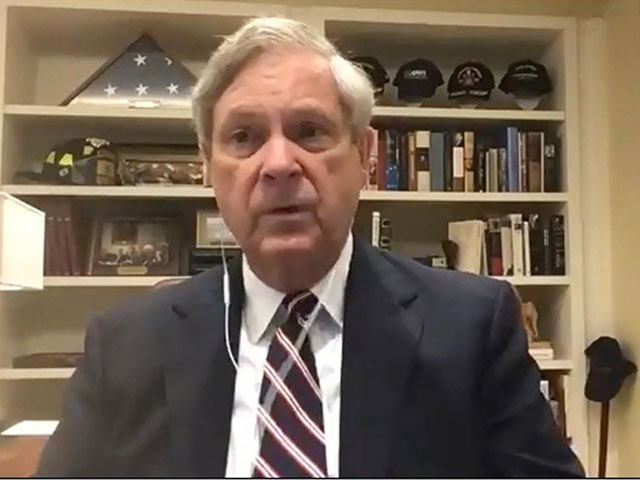USDA Rolls Out Renewable Energy Funds
Vilsack Sees Prospects for Infrastructure, Renewable Fuels Expansion in Build Back Better Act
OMAHA (DTN) -- Agriculture Secretary Tom Vilsack on Friday provided details on $633 million in projects to boost renewable energy and improve climate resiliency in rural areas; the secretary also used the opportunity to plug the administration's plans for infrastructure, the Build Back Better Act and biofuels.
The $633 million is for 793 projects across all 50 states and Puerto Rico. The funds come through five programs and will include $595 million in loans and $38 million in grants. Among those funds, $356 million will be used in the Renewable Energy for American Program (REAP) that will expand renewable energy for farmers and small business owners "lowering their costs and resulting in energy savings over time," Vilsack said on a call with reporters.
The secretary was in Pennsylvania on Friday to spotlight REAP grants in that state.
FROM SOLAR TO HYDROPONIC LETTUCE FARMS
The projects funded include a mix of both large and small loans and grants. A large solar farm in Illinois will receive an $85.7 million loan that will provide power to 23 rural electric cooperatives in Illinois, Indiana and Missouri. On the smaller side, a hydroponic lettuce farm will receive a $35,000 grant to invest in a solar system, Vilsack highlighted. Some grants to individual producers were as small as about $3,200.
Rural electric infrastructure will receive $35 million under the Community Facility Disaster Program. Another $32 million will involve rural energy savings to improve energy efficiency for businesses and farms. USDA will spend $3 million in nine states to expand access to higher biofuel blends as well.
The projects funded in Friday's announcement are also "very consistent with the work that will be done as a result of the Infrastructure Investment and Jobs Act," Vilsack said, pointing to the $1.2 trillion bill signed into law in mid-November. The secretary added he's looking forward to making further announcements on rural broadband as well as other infrastructure projects in rural America. The administration is looking now at "shovel-ready projects" to begin announcing project funding throughout 2022.
"This is a bill that I think will have concrete results that will create jobs," he said. "We're looking forward to working with our state and local partners to make sure that these projects -- including the ones that we're announcing today -- are done on time, on task and on budget."
P[L1] D[0x0] M[300x250] OOP[F] ADUNIT[] T[]
The infrastructure law includes $65 billion overall for broadband expansion. USDA is focusing on that area, the secretary said. The department's ReConnect program has already spent about $1.5 billion, going back to the previous administration. Vilsack said the program would see another $2 billion going forward.
BUILD BACK BETTER ACT
Vilsack also plugged the Build Back Better Act, the $1.7 trillion bill passed by the House in November but now tied up in negotiations among Senate Democrats. Vilsack said the bill includes $10 billion to help rural electric cooperatives reduce emissions in their energy production while providing more reliable energy as well. The REAP program would receive another $2 billion, he said.
Asked about the risk that the Build Back Better Act could undermine farm bill baseline spending levels, the secretary chuckled and said the bill instead would provide "historic investments in conservation. That's obviously good news for farmers, ranchers and producers," he said, adding that funding climate-smart agriculture and forestry would help farmers take advantage of market demands for sustainable products. "Farmers are going to be in a position to take advantage of that opportunity. So, I don't have any reservations or concerns about this."
Republicans have raised concerns about the baseline issues as one of their complaints about the bill. Vilsack said it's unfortunate the bill does not have the same bipartisan support shown for the infrastructure act. He then went into a defense of provisions in the bill, arguing they would help farmers and rural families.
"The reality is this bill not only provides opportunities for greater resiliency in terms of climate and greater investment in conservation and forestry, that are important considerations for partner agriculture, but also lowers costs for American families and lowers taxes," Vilsack said. "So, the child credit, lowering costs with childcare, which is incredibly important, especially in rural places, rural families are continually struggling, struggling with the cost and availability (of) childcare. This bill addresses that issue in a very significant way. And probably in a very important way for rural places. The same thing would be true with preschool education, the same thing is true with assistance with college expansion. The same is true with lowering premium costs for health care. All of those issues directly affect, in a very real way, rural families where incomes are lower, or poverty rates are higher than in urban and suburban areas."
BIOFUELS, RFS AND AVIATION
Responding to questions, Vilsack also defended EPA's handling of the Renewable Fuels Standard in response to criticism from biofuel producers over delays in releasing mandated blend volumes for refiners. (See https://www.dtnpf.com/…)
Vilsack said he has worked with EPA Administrator Michael Regan in "providing some stability in the program." Vilsack said EPA will be tighter when it comes to granting small refinery waivers, for example.
"I fully expect and anticipate in the very near future EPA will announce those standards," he said. "And I think what's important is that they will likely also respond to the outstanding waiver requests that are currently indicating consistency with maintaining stability of the program."
The secretary indicated that $700 million in aid for biorefineries will come from USDA once EPA releases the blend volume requirements. That money will go directly to biofuel producers to help defer some of the costs they faced early in the pandemic when people were traveling less and using less fuel.
The Build Back Better bill also has another potential $1 billion in assistance for the biofuels industry, he said. The administration will spend $4.3 billion in a series of grants and loans to create a renewable aviation fuel industry. Vilsack said airlines such as United and American "are clamoring for a drop-in aviation fuel" that will comply with international standards for lower emissions as they deal with longer flights. The aviation fuel provisions in the Build Back Better Act are "an enormous opportunity to grow this industry," he said. (See past story about ethanol being used for aviation fuel at https://www.dtnpf.com/….)
Legislation also includes the potential to create a $35-billion market for sustainable aviation fuel from biofuel as well.
"If you look at the overall effort here, I think you're going to see consistent support for the RFS," he said. The drop-in aviation fuel, "will also be a great, great asset to the biofuels industry."
The project list of funds released Friday can be viewed at https://www.rd.usda.gov/…
Chris Clayton can be reached at Chris.Clayton@dtn.com
Follow him on Twitter @ChrisClaytonDTN
(c) Copyright 2021 DTN, LLC. All rights reserved.




